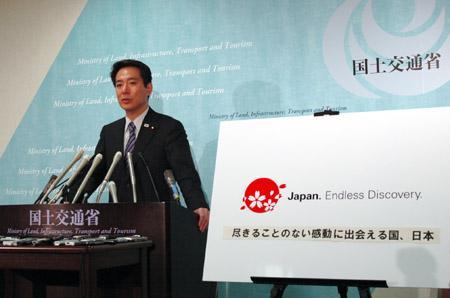
The Japanese government has announced a new international tourism slogan:
Great, at least this time it’s in English! It’s similar to many other simple catch phrases used by other countries: “Malaysia, truly Asia,” “Seoul’s got Soul,” and so on. The Japanese-language slogan is more of more of a mouthful and literally translates as “Japan, a country where you will encounter endless discovery.” There’s also a new logo with a stylish but classy combo of cherry blossoms and the Japanese Rising Sun.
I like “Endless Discovery” because it has a message that happens to be true. As a foreigner living in Japan most days there’s something new to discover. This message could help put new visitors in the right frame of mind to enjoy themselves. Japan’s not a country like Thailand where you can head straight to the resort and not worry about foreign customs. It’s an adventure in many respects – new food, few English speakers, complicated train system, etc. (and the area outside of Tokyo is even harder to navigate), so why not put a positive face on what Japan’s got to offer?
I’d like to give Maehara and his people some credit for picking a slogan that actually makes sense. It’s comforting to think the people in power might actually understand the outside world a little bit. It’s one big, noticeable difference between the parties.
This will replace the old slogan Yokoso! Japan, announced in 2003 to much confusion by most people who had no idea yokoso means “welcome” in Japanese. Well-known Japan commentator Alex Kerr was especially critical, saying it might as well be “blah blah blah Japan.” It’s been a favorite target of mockery among many in the gaijin community and can currently be seen on taxis, buses, posters, and even transport minister Maehara’s lapel pin. You’ll be missed! The “Visit Japan Campaign 2010” site is still up, so you can soak up some of the goodness before it closes. There’s other questionable language on the site, like “Yokoso Bazar” and “Revalue Nippon.”
Perhaps the best promotion in the campaign was this ad by then-Prime Minister Junichiro Koizumi:
“We will welcome you with a hearty Yokoso and smiiiile.”
I’ll never understand why that didn’t work.
So farewell, Yokoso Japan! You will soon be yet another relic of the past, just like those Tokyo Olympic 2016 ads and the wanted posters for Lindsey Ann Hawker’s killer.
**
Just as a bit of speculation, some of you might remember that the DPJ has relied on American firms for PR (Fleishman-Hillard in 2005 and possibly today), while the LDP and bureaucracy often relied on domestic firms (Prap Japan in 2005, ad giant Dentsu in 2009). Could that have had made a difference?


